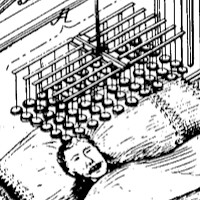A Declaration of War (July 28, 1914)

On June 28, 1914, Archduke Franz Ferdinand—heir to the Austria-Hungarian Epmire—was assassinated on the streets of Sarajevo. Three weeks later, the Austrian government decided that the only possibility was that Serbia (with whom there had been deep tensions) was solely to blame and, therefore, entirely responsible.
On July 23, 1914, an ultimatum arrived in Belgrade. The instructions were clear: read and give response by 6pm the following Saturday (July 25). An examination of the ultimatum lends credence to the theory that the ultimatum was intended to be unacceptable. Austria wanted war.
But why?
Looking back over European history at that time, in 1911, a small war broke out in North Africa between Italy and the Ottoman Empire (Turks). The Turks lost that battle and Serbia, Bulgaria, and Greece decided to try to take away more land from the Ottoman Empire. The Turks, backed by Germany fought against Serbia (backed by France), and lost yet again. After squabbles with Bulgaria and Greece over the spoils of the victory, Serbia ended up holding a seaport in Albania—the nation that the Turks were forced to grant independence.
To say that Austria-Hungary government was displeased would be an understatement. They moved into Bosnia and removed as many Serbs as they could. The surge in Serbian nationalism disquieted Austria-Hungary and they wanted a war. Russia swore to back the Serbian military, but Germany refused to back Austria-Hungry in any offensive maneuver against Serbia. Fearing the forces of Russia without support, Austria-Hungary withdrew the idea of declaring war on Serbia. Not desiring war themselves, Serbia withdrew from the sea port in Albania.
Europe was a festering pot of paranoia during the years of 1911 through 1914. Russia wanted to go to war with Germany because Germany was gaining land in the Balkans, which could potentially hinder Russia’s trade with the Mediterranean. Austria-Hungary wanted to declare war on Serbia because Serbia was gaining influence and prestige. Germany wanted to support Austria-Hungary, but wasn’t quite ready to take on Russia. Germany also wanted to attack Britain, but wanted to wait until they had better access via the canal that would be completed in 1916.
Bosnian Serbs despised the Hapsburg rule. Franz Josef I had visited Sarajevo in 1910, with two rows of armed guards separating him from the Serbs in attendance. Archduke Franz Ferdinand would not take such precautions in June of 1914. A Serbian student, who had been rejected for military service, wanted to prove his worth to his country. Gavrilo Princip, along with several other co-conspirators, went to the rally in Sarajevo with the sole purpose to assassinate the heir to the Hapsburg empire. Which, they eventually succeeded in doing.
Archduke Ferdinand was sympathetic to the Serbs. He, in fact, was quite unpopular among many of Austria’s conservatives. Ferdinand wanted autonomy for the Serbs—just like what had been granted to the Hungarians.
The limo in which the Archduke and his wife rode made a wrong turn. In the process of correcting the turn, they were both shot and bled to death as they were taken to the hospital. Princip, who had a very clear shot at the Archduke, was beaten and taken to prison.
Upon hearing of the assassination, Serbian leaders issued their heart-felt condolences to the Austria-Hungary empire and sought out those who had aided in the assassination. The people had been celebrating the death of the Hapsburg heir, but the government ordered them home and shops closed in mourning of the loss.
Austria went to Germany and stated the Serbs needed to be punished. Wilhelm agreed and assumed his cousin, Tsar Nicolas II of Russia would as well. Neither assumed war would be the answer. In fact, no one in the rest of the world even knew that thoughts of war were brewing within the heads of the leaders of Austria.
The blame was not placed on a lack of security. The blame was placed on the Serbs. In particular, they blamed the Serbian government because the assassins were Serbian nationalists—which the government had been encouraging. On July 23, 1914, an ultimatum arrived in Belgrade. On it were ten items that the Serbian government had to agree to. Of those ten, only item six was disagreeable to Serbia—the involvement of Austria-Hungarian agents in the investigation of the assassination. That one issue violated the Constitution of Serbia.
It was enough to start a War.
On July 28, 1914, at 11am, Austria-Hungary declared war on Serbia. It would be the first great war the world had ever seen. The question remains, however, of whether Princip had been contracted by the Austrian conservatives to assassinate the Archduke, or if Princip acted on his own free will. We may never know the truth, but we can certainly speculate and draw our own conclusions.
For more information or to view the sources for this article, please visit the following links:
War in Europe
The July Ultimatum (text)
Archduke Franz Ferdinand (wikipedia)
On July 23, 1914, an ultimatum arrived in Belgrade. The instructions were clear: read and give response by 6pm the following Saturday (July 25). An examination of the ultimatum lends credence to the theory that the ultimatum was intended to be unacceptable. Austria wanted war.
But why?
Looking back over European history at that time, in 1911, a small war broke out in North Africa between Italy and the Ottoman Empire (Turks). The Turks lost that battle and Serbia, Bulgaria, and Greece decided to try to take away more land from the Ottoman Empire. The Turks, backed by Germany fought against Serbia (backed by France), and lost yet again. After squabbles with Bulgaria and Greece over the spoils of the victory, Serbia ended up holding a seaport in Albania—the nation that the Turks were forced to grant independence.
To say that Austria-Hungary government was displeased would be an understatement. They moved into Bosnia and removed as many Serbs as they could. The surge in Serbian nationalism disquieted Austria-Hungary and they wanted a war. Russia swore to back the Serbian military, but Germany refused to back Austria-Hungry in any offensive maneuver against Serbia. Fearing the forces of Russia without support, Austria-Hungary withdrew the idea of declaring war on Serbia. Not desiring war themselves, Serbia withdrew from the sea port in Albania.
Europe was a festering pot of paranoia during the years of 1911 through 1914. Russia wanted to go to war with Germany because Germany was gaining land in the Balkans, which could potentially hinder Russia’s trade with the Mediterranean. Austria-Hungary wanted to declare war on Serbia because Serbia was gaining influence and prestige. Germany wanted to support Austria-Hungary, but wasn’t quite ready to take on Russia. Germany also wanted to attack Britain, but wanted to wait until they had better access via the canal that would be completed in 1916.
Bosnian Serbs despised the Hapsburg rule. Franz Josef I had visited Sarajevo in 1910, with two rows of armed guards separating him from the Serbs in attendance. Archduke Franz Ferdinand would not take such precautions in June of 1914. A Serbian student, who had been rejected for military service, wanted to prove his worth to his country. Gavrilo Princip, along with several other co-conspirators, went to the rally in Sarajevo with the sole purpose to assassinate the heir to the Hapsburg empire. Which, they eventually succeeded in doing.
Archduke Ferdinand was sympathetic to the Serbs. He, in fact, was quite unpopular among many of Austria’s conservatives. Ferdinand wanted autonomy for the Serbs—just like what had been granted to the Hungarians.
The limo in which the Archduke and his wife rode made a wrong turn. In the process of correcting the turn, they were both shot and bled to death as they were taken to the hospital. Princip, who had a very clear shot at the Archduke, was beaten and taken to prison.
Upon hearing of the assassination, Serbian leaders issued their heart-felt condolences to the Austria-Hungary empire and sought out those who had aided in the assassination. The people had been celebrating the death of the Hapsburg heir, but the government ordered them home and shops closed in mourning of the loss.
Austria went to Germany and stated the Serbs needed to be punished. Wilhelm agreed and assumed his cousin, Tsar Nicolas II of Russia would as well. Neither assumed war would be the answer. In fact, no one in the rest of the world even knew that thoughts of war were brewing within the heads of the leaders of Austria.
The blame was not placed on a lack of security. The blame was placed on the Serbs. In particular, they blamed the Serbian government because the assassins were Serbian nationalists—which the government had been encouraging. On July 23, 1914, an ultimatum arrived in Belgrade. On it were ten items that the Serbian government had to agree to. Of those ten, only item six was disagreeable to Serbia—the involvement of Austria-Hungarian agents in the investigation of the assassination. That one issue violated the Constitution of Serbia.
It was enough to start a War.
On July 28, 1914, at 11am, Austria-Hungary declared war on Serbia. It would be the first great war the world had ever seen. The question remains, however, of whether Princip had been contracted by the Austrian conservatives to assassinate the Archduke, or if Princip acted on his own free will. We may never know the truth, but we can certainly speculate and draw our own conclusions.
For more information or to view the sources for this article, please visit the following links:
War in Europe
The July Ultimatum (text)
Archduke Franz Ferdinand (wikipedia)
You Should Also Read:
The Tunguska Event
Incident at Chappaquiddick
Revisiting Roswell

Related Articles
Editor's Picks Articles
Top Ten Articles
Previous Features
Site Map
Content copyright © 2023 by Christa Mackey. All rights reserved.
This content was written by Christa Mackey. If you wish to use this content in any manner, you need written permission. Contact Lane Graciano for details.







